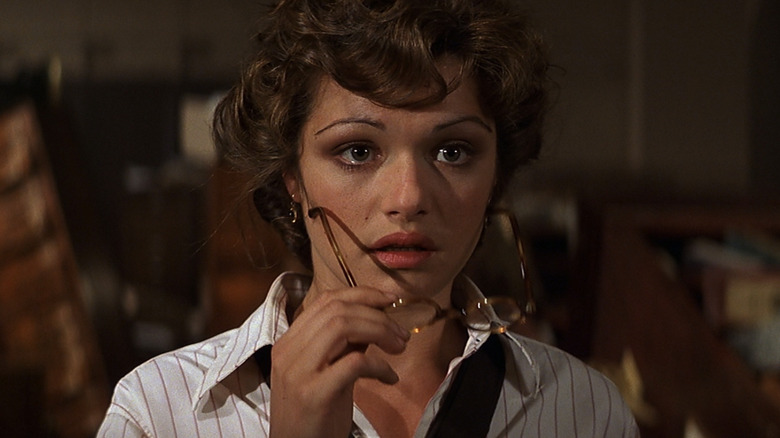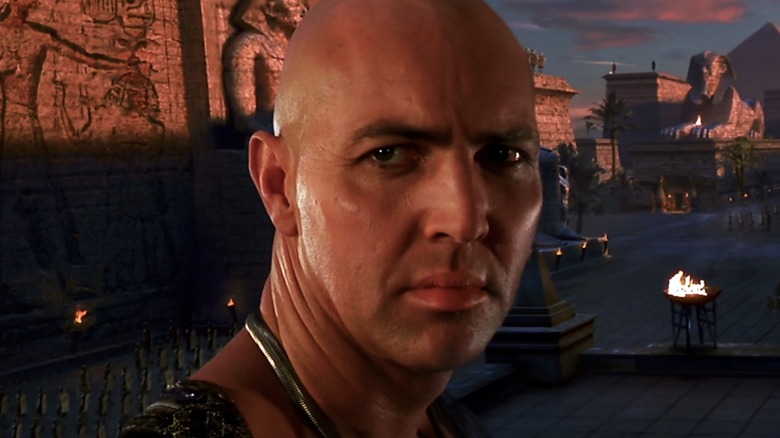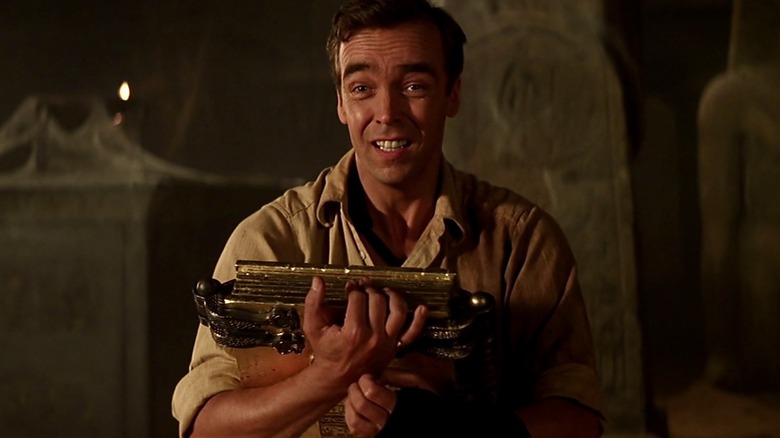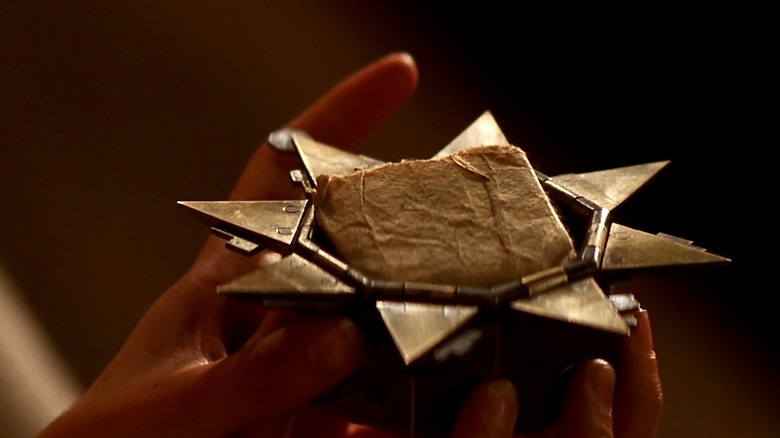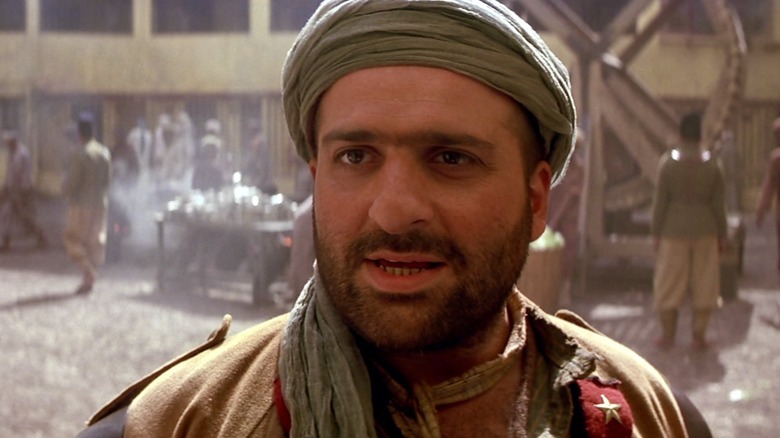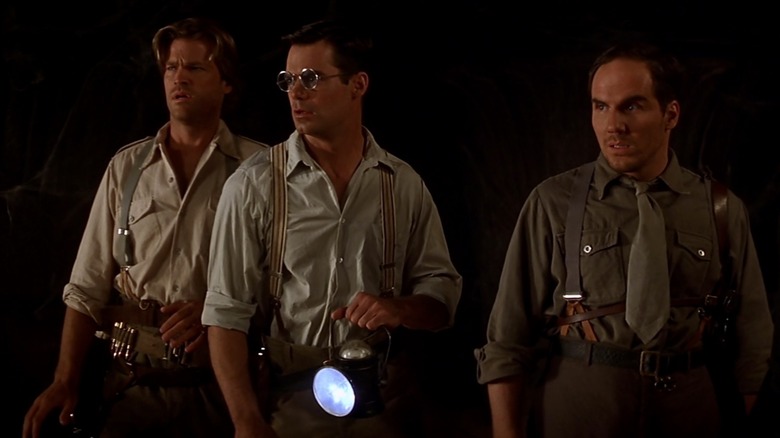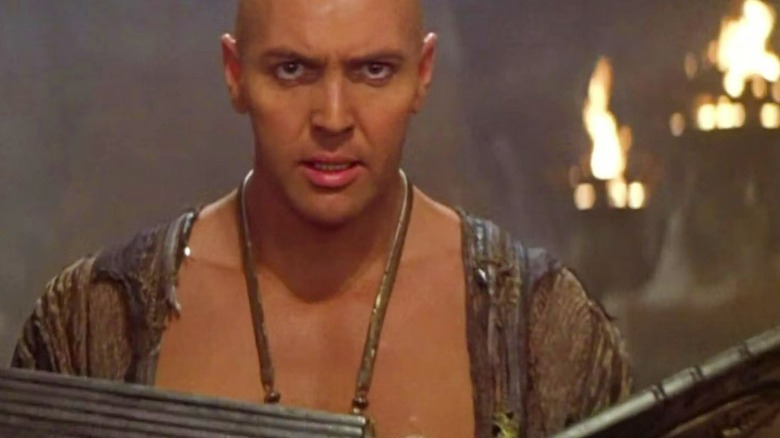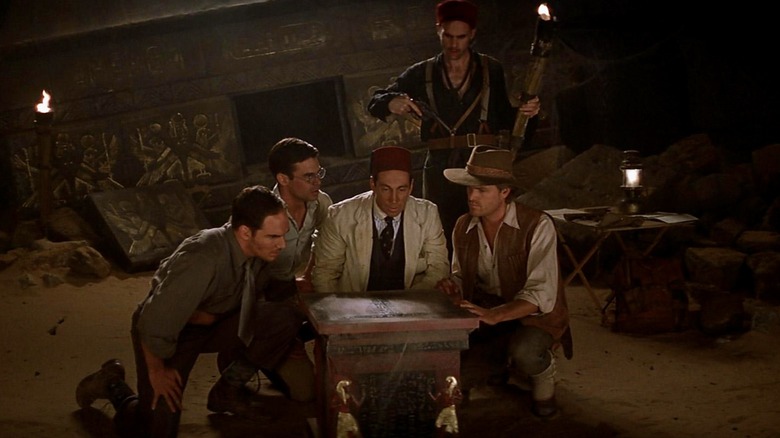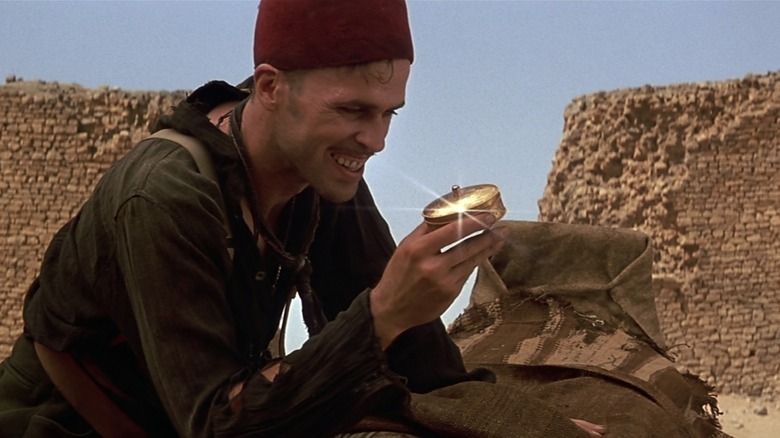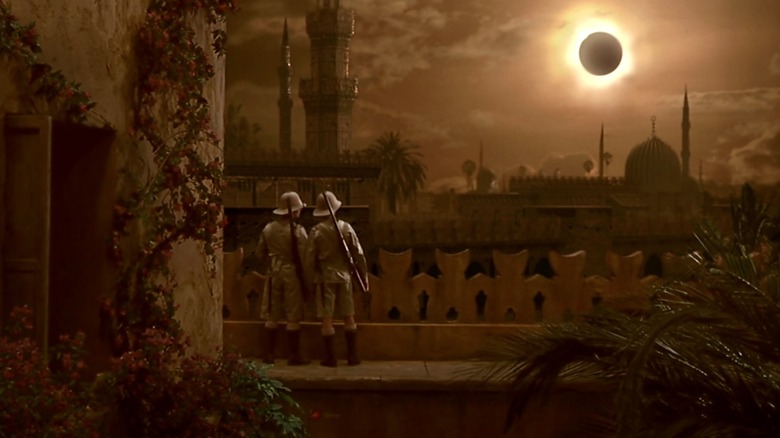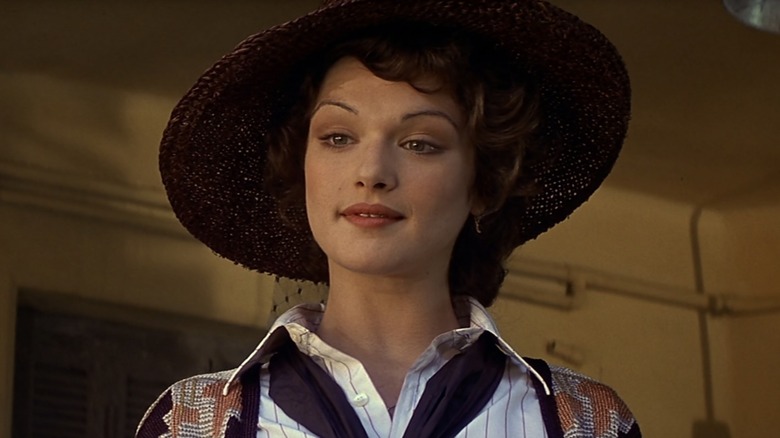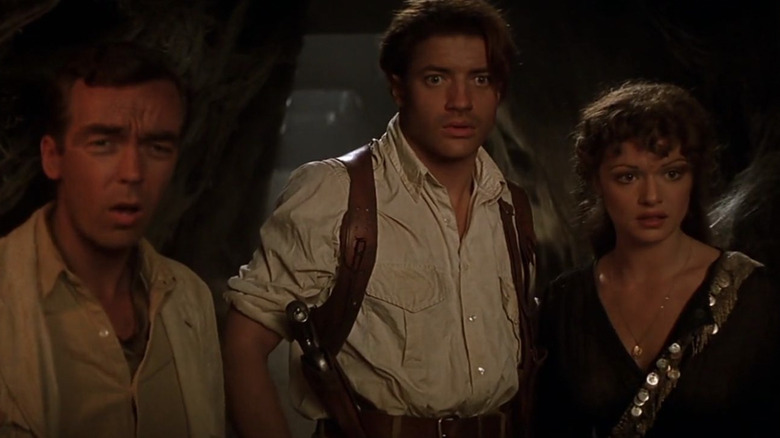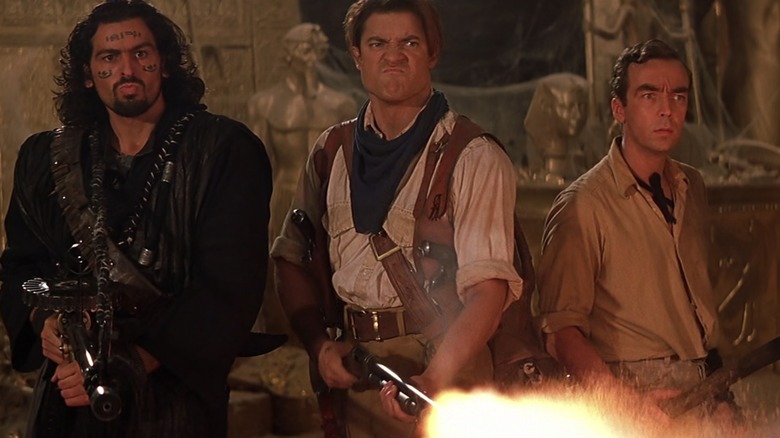Things In The Mummy You Only Notice After Watching More Than Once
Brendan Fraser is having a well-deserved career renaissance these days, after getting an Oscar nod for his role in Darren Aronofsky's 2022 film "The Whale." If you're anything like the rest of us, you've probably been revisiting some of your old favorites of his movies. Fraser starred in some exciting, funny, quirky, and memorable '90s movies but arguably, the role that launched him into super-stardom was as the iconic treasure hunter Rick O'Connell in Stephen Sommers' 1999 influential action-adventure hit "The Mummy."
Set in the 1920s, the film follows Rick O'Connell, who has the knowledge and experience to lead the librarian Evelyn (Rachel Weisz) and her brother Jonathan (John Hannah) to Hamunaptra or the City of the Dead. There, they accidentally trigger a centuries-old curse and awaken a supposedly long-dead ancient Egyptian high priest.
"The Mummy" is a remake of Universal's 1932 monster movie starring Boris Karloff. Although it kept the same title and many story elements from the original film, it has its own fresh vibe that audiences have responded to over the years. Sommers' hit was Oscar-nominated, launched Rachel Weisz's career, and has become a viral meme because the entire cast's extreme hotness basically aroused an entire generation's infatuation.
The first time you sit down to watch this wild ride through history and across the desert, everything happens so quickly that some important details probably slipped right past you. We've put together a list of some things about "The Mummy" that may have popped out at you after a few viewings, which you may not have caught the first time around. Spoilers ahead!
The Mummy only explores Imhotep's backstory
"The Mummy" opens with an extensive prologue about High Priest Imhotep's (Arnold Vosloo) backstory in ancient Egypt. He had a secret relationship with Anuck-Su-Namun (Patricia Velasquez), the mistress of Pharaoh Seti I (Aharon Ipalé), and the two of them died for their forbidden love and betrayal.
The film is so fun and exciting that on first viewing, you may not realize that this is actually the only exposition and backstory the audience gets. "The Mummy" largely exists in the present moment with minimal references to the pasts of other central characters.
While we find out that Evelyn or Evie and Jonathan Carnahan's parents died, we never learn what happened to them. Nor do we discover what brought Jonathan to Egypt, other than following his sister. We also know nothing of Rick's past before he joined the French Foreign Legion and traveled to Hamunaptra with his garrison, where he was attacked by the Medjai.
This lack of backstory contributes to the fast pace of the film and its lighthearted comedic vibe. The plot propels the characters forward at a breakneck speed, so they don't have much time to ruminate.
However, this approach also leaves some significant unanswered questions in "The Mummy," but luckily, the 2001 sequel "The Mummy Returns" addresses some of them. In that film, we learn about Rick's mysterious tattoo and childhood in an orphanage in Cairo, as well as Evie's past life connection to ancient Egypt and Pharaoh Seti's royal court.
Jonathan's career is a complete mystery
When Jonathan startles Evie at the museum by hiding in a coffin with a mummy and jumping out at her, we immediately understand the archetype Jonathan represents: He's the comic relief sidekick. But after a bit of reflection and a couple of more viewings, you might realize this first interaction between brother and sister teaches us much more about Jonathan than you noticed the first time.
Evie accuses Jonathan of trying to ruin her career like he ruined his, which makes us wonder what exactly his career is. The film depicts him as a professional thief, gambler, and drinker. This interaction doesn't reveal what Jonathan's career was but it suggests he feels lost and like a failure.
He jokes about wishing he could join the dead and complains about finding nothing of value on archeological digs. This plants the seed that Jonathan may have been an Egyptologist at one point, although he isn't as knowledgeable as Evie.
Tor honed in on how Jonathan's dialogue hints at a more tragic past. Given his age and the era, it is possible Jonathan fought in WWI and has PTSD, which has left him shell-shocked.
Much like Winston (Bernard Fox) of the Royal Air Force, Jonathan may suffer from survivors' guilt, drowning his torment in booze and questionable decisions. Although none of the other films in "The Mummy" franchise reveal Jonathan's ruined career, he proves himself resourceful and entrepreneurial throughout.
Why was the map to Hamunaptra inside the key to Imhotep's sarcophagus
It's probably best to not spend too much time tearing this little plot hole apart. Obviously, the puzzle box containing the map had to come into Rick, Jonathan, and Evie's possession for this wild adventure to transpire, and "The Mummy" wouldn't exist without Rick finding the puzzle box. But on another viewing, did you think it was foolish of the Medjai to put the map in the key and then bury them in Hamunaptra near Imhotep's sarcophagus?
If the Medjai were trying to prevent Imhotep from being resurrected, why didn't they separate the map from the key and send them to different continents? Or better yet, why didn't they simply destroy the map and key? One thing you may have not noticed during your first, second, or even third viewing, is that when Evie's boss at the museum in Cairo, Dr. Terrence Bey (Erick Avari), accidentally lights the map on fire and burns off the location of Hamunaptra, he is actually performing his duties as a Medjai to keep the location a secret.
Many of the ethnic characters are reduced to stereotypes
Although "The Mummy" is a nostalgic film for a lot of us who saw it as children or teens, there are some questionable things you might have not noticed during your first viewing. One problematic aspect of "The Mummy" is that many of the ethnic characters are depicted as one-dimensional racial stereotypes. Ardeth Bay (Oded Fehr) is treated with respect and gravitas, but this proves to be a somewhat unique representation in the film.
Cracked said the movie is "aggressively racist," as it's filled with "actors of various nationalities playing Arabs, who are usually offensive caricatures." This is especially the case with the character of the Warden Gad Hassan (Omid Djalili), who is often the butt of racist jokes in the film, as Jonathan in particular talks about how bad Gad Hassan smells.
Looking back on his role, Djalili told Entertainment Weekly that because of his Iranian background, he felt the weight of representing Middle Eastern culture. He asked Sommers, "Look, why don't we play [Gad Hassan] differently because, with all due respect to you, what you've written is not even one-dimensional. I can possibly get this to a two-dimensional stereotype."
Stereotypical and offensive depictions of Egyptians aren't the only problematic facets of "The Mummy." The casting of the ancient high priest Imhotep with an actor of Dutch ancestry is an example of Hollywood's proclivity towards casting white actors in non-white roles.
In 2019, Arnold Vosloo told Entertainment Weekly, "I always wonder: If it were happening today, would I get the part? I mean, here I am — white, South African. They'd probably cast a real Egyptian."
The film portrays Americans as belligerent fools
"The Mummy" includes a group of Americans – Mr. Henderson (Stephen Dunham), Mr. Daniels (Corey Johnson), and Mr. Burns (Tuc Watkins) — who are traveling to Hamunaptra and they aren't depicted in the most glowing light either.
Evie and Jonathan, who grew up in the UK, both make derisive comments about the Americans at their dig site before telling Rick, "no offense," almost as an afterthought. And okay, perhaps there isn't that much offense to it, since these Americans actually are grave robbers and it feels like these digs at the Americans are a good-natured way to poke fun at Americans' international reputation for being terrible tourists (via The New York Times).
The first time we see the Americans depicted as nutty yahoos is when they become embroiled in a gun battle with the Medjai warriors. They hoot and holler as they use six-shooters with reckless abandon while the barge burns around them. The Americans then barrel forward at the dig site and open the chest despite the warnings of Beni (Kevin J. O'Connor) and the Egyptologist, Dr. Allen Chamberlain (Jonathan Hyde). After Imhotep hunts them to suck them dry to regain his flesh and power, the Americans prove to be all bluster with little bravery to back it up.
Imhotep mistakes Evie for Anuck-Su-Namun because he's nearsighted
After taking Mr. Burns' eyes and tongue, Imhotep mistakes Evie for Anuck-Su-Namun. It might seem like Imhotep is just totally obsessed with his deceased paramour, but after watching "The Mummy" a few times, it becomes clear this is a gag referencing Mr. Burns' poor eyesight. When we first meet Mr. Burns on the barge, his compatriots give him a hard time for cleaning his glasses rather than dealing the cards, to which Mr. Burns replies, "Without my glasses, I can't see the deck to cut it, can I Dave?"
It is also Mr. Burns' poor eyesight that makes him vulnerable to becoming Imhotep's first victim. When Evie awakens Imhotep by reading from the Book of the Dead, locusts begin to swarm Hamunaptra and there's a mad dash to escape in which Mr. Burns falls and loses his glasses. Beni accidentally crushes Mr. Burns' glasses while he's fleeing, leaving Mr. Burns to his unfortunate fate.
Imhotep then takes Burns' eyes and tongue before meeting Evie. Since Imhotep is rebuilding his body from the American's organs, it makes sense that until Imhotep is fully regenerated and has his ancient Egyptian mojo back, he just might be nearsighted, like his very first organ donor.
All the characters have a finders-keepers mentality except Evie
Nearly everyone headed to Hamunaptra is a grave robber, who takes no moral or ethical issue with stealing from the dead or another culture. Greed motivates Jonathan, despite being connected to Egypt through his mother's lineage. Warden Gad Hassan is driven by avarice, as are Beni and the Americans. Dr. Allen Chamberlain seems to be a serious archeologist, but the way he cradles the Book of the Dead after finding it with the Canopic jars suggests that he too covets treasure. On the barge, Rick boasts, "I know my treasure" in response to Evie being impressed that he knows the Book of Amun-Ra was rumored to be made of pure gold.
In a historical context, this 1920s Egyptian treasure fever is fairly accurate. Per The Collector, tombs have been robbed in Egypt since ancient times, and few made it to modernity without being raided. According to History, even King Tutankhamun's tomb had been partially pillaged before it was "discovered" by British archaeologists Howard Carter and his financier Lord Carnarvon in 1922. However, recent evidence suggests that Carter may have actually been the one to disturb the tomb before its official opening (via The Guardian).
"The Mummy" is historically accurate in its depiction of enthusiastic grave-robbers, which can make it easy to overlook the fact that there's one person who's not looking to just line her pockets: Evie. She has academic and philanthropic interests in discovering more about ancient Egyptian culture, as she hopes to fill museums — not her bank account — with riches.
Most characters are punished for their greed
Although almost everyone is depicted as greedy in "The Mummy," the film doesn't celebrate this attribute. The overwhelming message is that although avarice was common amongst those who visited ancient Egyptian sites — looting the country of its history and wealth during the 1920s — greed is decidedly not good. Most of the characters who are motivated by it end up dying horribly.
Warden Gad Hassan dies painfully after a scarab crawls under his skin and eats him from the inside out. Imhotep sucks the Americans and their Egyptologist dry, leaving behind shell-like husks. Beni dies in the treasure room after the crypt self-destructs and scarabs eat him alive. While most of the characters are punished for their greed with a gruesome death, somehow, Jonathan comes up smelling like roses at the end of the film.
Ultimately, Jonathan is handsomely rewarded with saddlebags filled with treasure because he sets aside his selfish desires to help Rick save Evie and send Imhotep back to the underworld. Although Rick begins the film as a questionable character, who's interested first and foremost in finding treasure, when the chips are down, he doesn't run away like he wants to.
In the end, Rick, Evie, Jonathan, and Ardeth band together and forsake all that glittering gold in the treasure room. Instead, they take responsibility for their part in resurrecting Imhotep and it's this refusal to let their greed win that rewards them in the end.
Imhotep doesn't release all 10 plagues of Egypt
On multiple viewings of "The Mummy," you might realize that Imhotep having the power of the 10 plagues of Egypt doesn't quite add up. In the Book of Exodus, God unleashes 10 plagues — such as locusts, blood, and boils — upon Egypt because the Pharaoh refuses to let Moses' people go (via The British Library). While the identity of that Pharaoh has been debated, most people believe that it refers to Ramses II, the successor of King Seti I (via National Geographic).
In the world of "The Mummy," that means that Imhotep gets cursed with the Hom-Daj before the 10 plagues are unleashed upon Egypt, which creates a bit of a historical plot hole.
Locusts swarm Hamunaptra right after Evie resurrects Imhotep by reading from the Book of the Dead, which verifies that Imhotep has the power to bring the 10 plagues of Egypt with him. Although we see many of the plagues released, including locusts, flies, hail, an eerie eclipse, and Jonathan's favorite —boils — we don't see all 10 of ancient Egypt's plagues manifest (via Time). Maybe the frogs, lice, and livestock pestilence happened somewhere outside of Cairo while burning hail destroyed the city. Luckily for Jonathan, the last and perhaps most devastating plague — the death of firstborn sons — never materializes.
Evie subtly subverts gender norms and genre tropes
Evie might start out "The Mummy" as a librarian, but she's an adventurer at heart and the more times you watch it, the more you realize how her character isn't restricted by gender norms or genre tropes. When the Warden makes an indecent proposal while bargaining for Rick's life, Evie smacks his hand away and negotiates a smaller share of the treasure for Rick's release. Evie is also the most distinguished in her career amongst the core characters.
Evie is knowledgeable of Egyptian history and archeology and both Jonathan and Rick to respect that she is in charge of the dig site. She isn't just feisty and smart; she's nearly fearless. The weird noises in Hamunaptra do not frighten her, because she isn't superstitious. After Evie sees Imhotep and accepts that he is real, she refuses to run away like Rick wants her to. Instead, Evie takes responsibility and insists they deal with Imhotep because she's the one who set him free.
Although there are points in the film where it looks like Evie is being painted as a damsel in distress — Rick even calls her one to Winston — she consistently pushes against this. There are disconcerting moments, such as Rick kissing her without consent and locking her in a room to protect her from Imhotep, but still, Evie pushes back.
When Imhotep takes Evie hostage, she goes with him willingly in order to save everyone from his zombies. She's an integral part of the team, rather than a two-dimensional love interest in service of the male hero.
None of the main characters could have defeated Imhotep alone
While it's easy to see Rick as the quintessential hero mixed with a dash of Laurel and Hardy, it's clear on multiple viewings that he can't kill Imhotep on his own. Sure, Rick is strong, well-trained, brave, and knows his way around an armory, but he doesn't know how to read Ancient Egyptian. Jonathan may have fudged his way through the cover of the Book of the Dead to gain control of Imhotep's warriors, kill Anuck-Sun-Namun, and save Evie, but he also isn't fluent in Ancient Egyptian.
Evie is fluent in Ancient Egyptian and uses that skill to translate the Book of Amun-Ra and make Imhotep mortal again. However, she never would have been able to even open the Book of Amun Ra without Rick distracting Imhotep and Jonathan stealing the key from the high priest's robe.
And let's face it, neither Rick nor Jonathan would have ever made it past Imhotep's mummy followers to rescue Evie without Ardeth's bravery and skills as a warrior.
Rick, Evie, Jonathan, and Ardeth all bring their own distinct character traits and talents together at the end of "The Mummy" to vanquish Imhotep and send him back to the afterlife where he belongs. The more you watch "The Mummy," the more you see how none of them could have done it alone, which is part of what makes this movie so great: Each character brings their own strengths and heroism to this team effort of winning the final battle.
The Mummy doesn't include a tie-in for a sequel
Brendan Fraser told The Pop Verse that he loved being in "The Mummy" saying, "I loved being part of a movie that we didn't know if it was an action, comedy, horror, adventure, romance. All of the above. We didn't know what we had on our hands, and there was a certain sense of liberty and excitement about it." This enthusiasm was clearly infectious to audiences, as the action-adventure monster-movie mash-up became a commercial success, which lead to an even more profitable sequel (via Box Office Mojo).
These days, it seems like most blockbusters drop a cliffhanger at the end of the movie just in case it's successful enough to warrant making a sequel, but "The Mummy" doesn't do this. It can be easy to miss on the first viewing because this film did spawn a franchise but "The Mummy" in fact is a complete story without an obvious plug for a follow-up. It ends with Rick and Evie kissing before they ride together with Jonathan on camels packed with treasures, heading towards an unknown future of adventures. There's no hook or final image setting the stage for the next story.
Although Stephen Sommers reportedly had plenty of ideas brewing in his head for a sequel (via Cinema.com), he wasn't planning on making one because, as he told Entertainment Weekly in 2001, "Sequels usually suck." But after receiving a call from the studio at 6 AM the morning after the Memorial Day weekend premiere, Sommers got to work writing "The Mummy Returns." The sequel builds upon the characters we already know from the first film, while adding some new antagonists and more ancient history.
